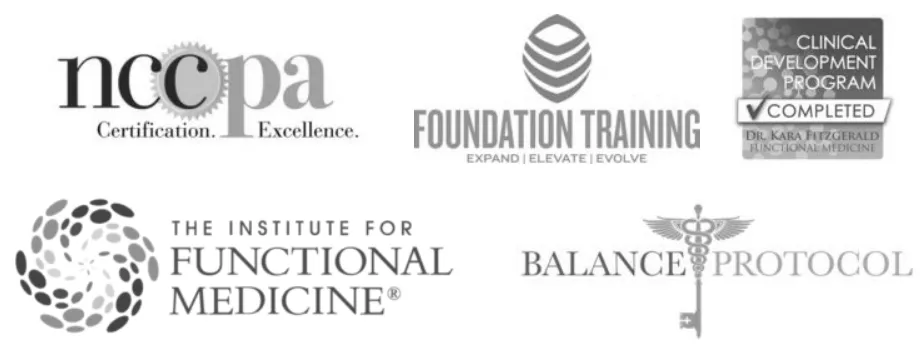About
I was halfway through school when it hit me.
My medical education was failing me.
I wanted to help people resolve their chronic health issues, but was instead taught the name it, blame it, tame it, game.
I learned how to put a name to a patient’s symptoms in the form of a diagnosis, blame the disease for how they were feeling, and tame their symptoms with a prescription.
I wasn’t healing my patients, I was managing symptoms.
And when the prescriptions didn’t work, we were taught to send our patients off to a specialist who would play the whole game all over again.
It was soul-sucking.
As someone who questions EVERYTHING, I couldn’t understand how my colleagues didn’t see that we weren’t really healing anyone.

So I began to search out clinicians who were getting amazing results for their patients and I soon discovered Functional Medicine. Functional Medicine works by recognizing that each person is unique and treating them as such. When practiced correctly, Functional Medicine is identifying all of the environmental, nutritional, mindset, and lifestyle factors that contribute to disease and resolving them.
It’s understanding that eating well is only a part of the health puzzle and that you cannot expect to feel amazing if you are staying up late staring at your phone, guzzling coffee, constantly stressed out, and spending your days indoors.
And it’s through working over a decade in medicine and training with some world-class clinicians that I learned how to leverage the body’s innate capacity to heal from all sorts of issues, from fatigue and brain fog, to gut issues, high cholesterol, high blood sugar, and more.
I’ve come to understand that even though our world is constantly evolving and it feels like it’s hard to keep up with all of the new information and technology, the principles to achieving peak health stay the same.
And I will show you exactly how.
—–
Jon is a Functional Medicine Physician Assistant turned Health Consultant. Jon is a graduate of Philadelphia College of Osteopathic Medicine and has worked in urgent care and addiction medicine before switching to Functional Medicine. He has also worked in pharmaceutical research, as an EMT, and an ER Tech.
When not working, Jon loves being outside, eating great food, and spending time with his four ladies — his wife, two daughters, and dog.
Credentials/Trainings

About

I was halfway through school when it hit me.
My medical education was failing me.
I wanted to help people resolve their chronic health issues, but was instead taught the name it, blame it, tame it, game.
I learned how to put a name to a patient’s symptoms in the form of a diagnosis, blame the disease for how they were feeling, and tame their symptoms with a prescription.
I wasn’t healing my patients, I was managing symptoms.
And when the prescriptions didn’t work, we were taught to send our patients off to a specialist who would play the whole game all over again.
It was soul-sucking.
As someone who questions EVERYTHING, I couldn’t understand how my colleagues didn’t see that we weren’t really healing anyone.
So I began to search out clinicians who were getting amazing results for their patients and I soon discovered Functional Medicine. Functional Medicine works by recognizing that each person is unique and treating them as such. When practiced correctly, Functional Medicine is identifying all of the environmental, nutritional, mindset, and lifestyle factors that contribute to disease and resolving them.
It’s understanding that eating well is only a part of the health puzzle and that you cannot expect to feel amazing if you are staying up late staring at your phone, guzzling coffee, constantly stressed out, and spending your days indoors.
And it’s through working over a decade in medicine and training with some world-class clinicians that I learned how to leverage the body’s innate capacity to heal from all sorts of issues, from fatigue and brain fog, to gut issues, high cholesterol, high blood sugar, and more.
I’ve come to understand that even though our world is constantly evolving and it feels like it’s hard to keep up with all of the new information and technology, the principles to achieving peak health stay the same.
And I will show you exactly how.
—–
Jon is a Functional Medicine Physician Assistant turned Health Consultant. Jon is a graduate of Philadelphia College of Osteopathic Medicine and has worked in urgent care and addiction medicine before switching to Functional Medicine. He has also worked in pharmaceutical research, as an EMT, and an ER Tech.
When not working, Jon loves being outside, eating great food, and spending time with his four ladies — his wife, two daughters, and dog.
Credentials/Trainings

Apply To Work With Jon
Ready to take action? I'm here for you.
Sign up for an un-awkward, no-cost, no-obligation discovery call.


